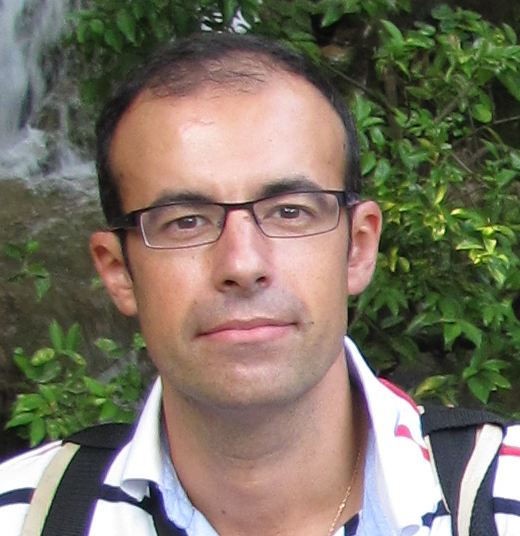Juan Pablo Martínez Cortés
March 2015
The expert in the Spotlight feature gives you the chance to interact one-on-one with our Ask the expert-section. The feature also provides interesting and insightful comments regarding the subjects mentioned above, in-depth content and exclusive Q and A's.

Featured Expert / Area of focus:
Juan Pablo Martínez Cortés is Associate Professor in the Engineering School of the University of Zaragoza, in the area of Information and Communication Technologies. He is the coauthor of the Regional Dossier Aragonese in Spain, soon to be published by Mercator Research Centre.
What is your background in the field of regional and minority languages/education/ multilingualism?
I am an Associate Professor in the Engineering School of the University of Zaragoza, in the area of Information and Communication Technologies (ICTs). My field of research is in signal processing applied to biological signals, so it has no direct relationship with the field of regional and minority languages.
However, having a background in ICTs and being a speaker and advocate of Aragonese language and multilingualism, I saw the opportunities that new technologies could offer to minority and endangered languages as Aragonese. Since more than a decade ago, I have taken part and promoted a number of language dissemination, dynamization and revitalization projects, related to the use of Aragonese within the ICTs. These include creation and sharing of free content (e.g. Aragonese Wikipedia), distance learning or software localization projects. I have also been deeply involved in the development of open-source computational linguistic tools for Aragonese, as a text-to-voice conversor, a spellchecker or a machine translator system for Aragonese.
What do you think is the major challenge in your field of work?
A major challenge for Aragonese is to normalize its use within the new technologies, not only among new speakers and “language activists”, but also within native speakers. The generalization of social media has led to the creation of on-line communities, with increasing interaction and better understanding between both types of speakers, which we deem positive for the revitalization of the language. Nevertheless, language survival and revitalization will only be successful if intergenerational transmission is restored.
So, a very important challenge for minority language social linguistics is to analyze the effects of ICTs, social media and digital resources (localized sofware, wikipedia, spellcheckers, machine translation systems, etc.) on the perception of the language by theirs speakers and prove if they have a positive effect in the language maintenance and transmission. For that purpose, it is important to study the motivations of speakers for using the language online. This would allow using technology in an more efficient way to help language revitalization.
What is one of the hottest new projects / items you are working on?
I continue collaborating with the efforts to promote and facilitate the use of Aragonese within the new technologies, which are being performed by several volunteer working groups. One of the new projects is to improve the typing of texts in Aragonese on cell phones (e.g. with predictive text).
Together with Santiago Paricio, we are also trying to shed light on the relationship between Aragonese language use and technology, by identifying the different profiles of people using Aragonese online, their use of digital language resources, the frequency and motivation for using the language in the different domains of their life, and the language use in social networks (i.e. when and with whom they use Aragonese, motivations, and the role of the language in the decision to follow other people).
Are there any important references such as articles, links, etc. you would like to mention?
- Santiago Paricio Martín and Juan Pablo Martínez Cortés (2010). New ways to revitalise minority languages: the impact of the internet in the case of Aragonese, in Digithum, 12. Universitat Oberta de Catalunya.
- Juan Pablo Martínez Cortés, Jim O'Regan, Francis Tyers (2012): Free/open-source shallow-transfer based machine translation for Spanish and Aragonese. Proceedings of the 8th Conference on Language Resources and Evaluation, LREC2012, pp.2553-2557.
- Santiago Paricio Martín and Juan Pablo Martínez Cortés (2014). El uso del aragonés en Internet y las nuevas tecnologías: herramientas y repercusión. (in Spanish), in Chabier Gimeno and Natxo Sorolla (coord.). Actas II Jornadas Aragonesas de Sociología. Grupo de Trabajo “Lenguas e Identidades” pp. 105-120. Gara d’Edicions (ISBN 978-84-8094-069-6).
- Juan Pablo Martínez Cortés and Santiago Paricio Martín (2015). Aragonese; the Aragonese Language in Education in Spain. Mercator-Education Regional dossier Series. Leeuwarden/Ljouwert, Fryske Akademy.
- Daniel Cunliffe R. Herring (2005). Promoting minority-language use in a bilingual online community. New Review in Hypermedia and Multimedia, Vol. 11. No. 2. Pp. 157-179. Taylor and Francis Ltd.
- Daniel Cunliffe. (2009). The Welsh language on the internet: linguistic resistance in the age of the network society. In: G. Goggin, M. McLelland (eds.). Internationalizing Internet Studies: Beyond Anglophone Paradigms, pp. . 96-111. New York: Routledge.
- Candace K. Galla (2009). Indigenous Language Revitalization and Technology From Traditional to Contemporary Domains. In J. Reyhner & L. Lockard (eds.). Indigenous Language Revitalization: Encouragement, Guidance & Lessons Learned, pp. 167-182.
- Patrick Eisenloh. (2004) Language revitalization and new technologies: cultures of electronic mediation and the refiguring of communities. Annual Review of Anthropology, 33, 21-45.
- Moring, T. (2013). “Media Markets and Minority Languages in the Digital Age”. Journal of Ethnopolitics and Minority Issues in Europe, Vol. 12, No 4, Págs. 34-53.
Links to some projects related to ICTs and Aragonese:
- Apertium (open-source machine translation)

